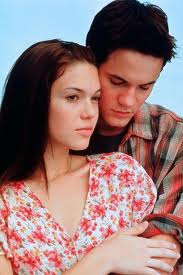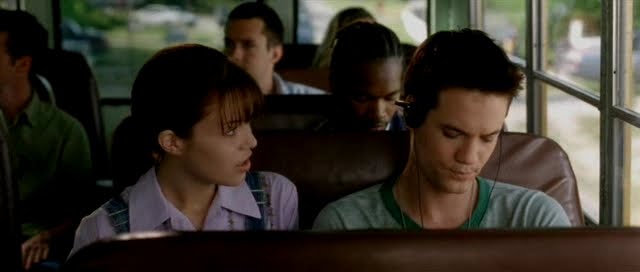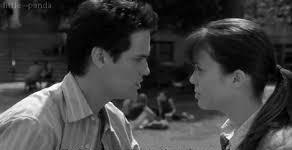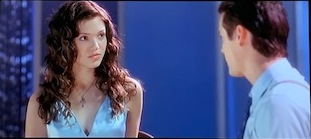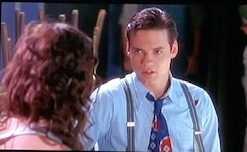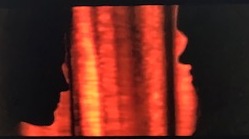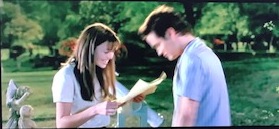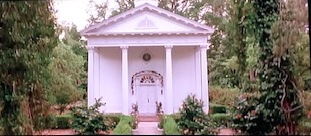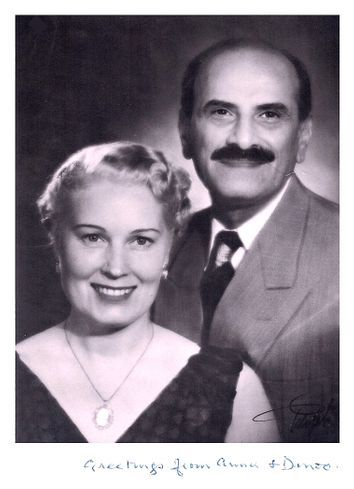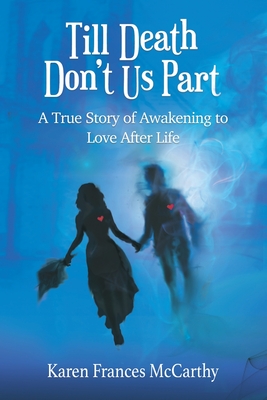|
home | what's new | other sites | contact | about |
||||||||||||
|
Word Gems exploring self-realization, sacred personhood, and full humanity
Jamie and Landon, the movie
return to 'Jamie and Landon' main-page
“A Walk to Remember is a 2002 American coming-of-age romantic drama film directed by Adam Shankman and written by Karen Janszen, based on Nicholas Sparks' 1999 novel of the same name. The film stars Shane West, Mandy Moore, Peter Coyote and Daryl Hannah, and was produced by Denise Di Novi and Hunt Lowry for Warner Bros. Pictures. “In Beaufort, North Carolina, popular and rebellious teenager Landon Carter is threatened with expulsion from school after he and his friends leave evidence of underage drinking on the school grounds, and seriously injure another student during a prank gone wrong. The principal of the school gives Landon the choice of being expelled or atoning for his actions by tutoring fellow students and participating in the school play. During these functions, Landon notices a girl, Jamie Sullivan, he has known since kindergarten and who has attended many of the same classes as him, and is also the local minister's daughter. Since he's one of the in-crowd, he has seldom paid any attention to Jamie, who wears modest dresses and owns only one sweater. Jamie is labeled an outsider and a geek only because of her strong interest in astronomy. She makes no attempt to wear make-up or otherwise improve her looks or attract attention to herself…” Wikipedia
Elenchus. I like these photos of Jamie and Landon touching foreheads. It’s one of the most erotic gestures of love. Kairissi. It’s a symbol of unguarded intimacy. E. You have to make yourself open and vulnerable to enjoy that kind of oneness. K. And you said that you like Jamie. E. I like her because she reminds me of you – she’s very principled, of excellent and positive spirit, always wanting to do her best, reaching for the top honor and achievement, not afraid to live her truth. Jamie’s not always right, but she stands up for what she sees as true. And that makes her beautiful. K. They came from two different worlds. Jamie was religious, had been taught to “come out of the world” with its materialistic ways. Landon was part of the cool group in high school, a sensualist, a hedonist, not infrequently in trouble. He was quite smart, but didn’t want to show his academic potential because that wouldn’t be cool. E. Is this a case of “opposites attract”? K. Not really. His “opposite” tendencies were just for public display. On a deeper level, he was just like her – intense, focused, courageous, even thoughtful. And once he realized he couldn’t live without her, he changed at the surface of life so fast that his friends hardly recognized him. E. Gene Roddenberry once taught his writers to live by the dictum, “What’s this story about?” meaning, it has to be more than a sequence of activities, so what’s the compelling principle of life or human-interest angle here? What would you say, Kriss? K. There’s an interpretation of this movie which suggests that Jamie is a “central sun,” unmoving in her idealism, with all others orbiting, influenced by her moral gravitational pull. E. There’s evidence for this assessment. By the end of the movie, almost everyone – classmates, parents, and, of course, Landon -- has found a kind of redemption. K. There’s some merit to it, but I think this view goes too far. Jamie is not an “unmoved mover.” She changes, too. But, what’s the real barrier between these two? E. They’d grown up together – that alone was a big obstacle. K. Explain what this means. E. They were convinced they knew every detail, thought they had each other all figured out. K. It’s actually a compelling argument. Listen to Landon: “I’ve seen you every day of my life since first grade. You always sit at the same lunch table and in the front row in class. You wear the same green sweater and you look at your feet when you walk; etc., etc.” E. And then she says, “You don’t know anything about me!” K. Meaning, “You have an image of me in your mind, and it has nothing to do with the real me!” E. There’s a saying, genius is looking at what everyone sees but noticing something new. But Landon was beyond even bothering to look. K. And Jamie, too, was not exempt from this narrow thinking. See her at the lockers now, putting Landon in his place: “I’ve known you all these years, Carter, and you’ve never come up to me once, so what are you trying to get from me?” And then, later, after wondering if she’d seen a spark of light in him, she sinks back into old judgments with, “I was wrong to think there could be any good in you.” E. It wasn’t looking too hopeful for them. Over the years each had created a rigid and entrenched mind-picture of the other. K. Yes, of course. Krishnamurti speaks of the “ego-images.” These, he says, account for all the division and separation of peoples in the world. E. When two ego-images interact, they’re not seeing the real person in the other. K. Nor in themselves, for that matter. E. Well, yes, there’s that, as well, because we also create false images of ourselves. K. So this means that, as their ego-images clashed, they’d never even met the real person “behind the mask.” They were strangers, though they’d grown up together. E. And then the question becomes, what does it take to break through that mental barrier? K. I think we know something about this, because we’ve lived through it in our own case. E. And now I would have to say, the movie does not provide accurate and realistic portrayal of how these “ego-images” are toppled for lovers. K. Explain this to us, Elenchus. E. The typical John-and-Mary couple of the world view each other in materialistic terms. They want to negotiate, “Can you make me happy?” For many couples, this means sexual fulfillment. Nothing wrong with the bio-attraction, but, if that’s the primary draw, then you’re just trading one false “ego-image” for another... K. ... because Mary is a real person, with real feelings and a real mind, and much more than the sum of her measurements. E. And so, when I say that the movie did not provide accurate and realistic portrayal of the dismantling of ego-images, I’m referring to the high-school play where Jamie and Landon kiss, and this is offered as the “opening of the eyes” toward each other. K. Or, the removal of the ego-image, which would allow them to see the real person in the other. E. But, if these two have something real between them, then I don’t think the new “sightedness” would have happened this way. K. What do you mean?
E. It’s all too superficial, with biology leading the parade. His “eyes open,” purportedly, during the famous kiss, when she’s all dolled-up and serenading him, in that beguiling satin pale-blue dress, with the lip gloss and the eye shadow and the exquisitely-curled hair. She looks like the goddess Athena having just arrived from Mount Olympus – and that’s a problem. His awakening, according to the script, is triggered by her five-star physical allurement – but I don’t think it necessarily happens that way in true love. If it’s real, he’ll more likely be overtaken by a discomfiting realization of her inner radiance, her inner beauty - and this can occur even if she’s working in mucky barn-boots on a bad-hair day. K. What we mean by all this is that a perception of “hey, suddenly I see you as the most beautiful girl in the world” doesn’t account for the heightened levels of consciousness that we witness in both of them by movie’s end.
E. It takes a lot more than physical beauty to awaken the soul. I mean, John can “fall in love” ten times a day if he happens to interact with ten different “perfect” girls. But none of this is going to change him on the deep inside. K. Let’s talk about how Jamie’s view of the world widened in the coming of Landon. E. I’m reminded of one of our favorite concepts, “sacred combat,” a phrase coined by psychologist John Welwood. It means, in the real love, two mates not only help each other grow spiritually but will not let each other get away with an atom’s worth of wrong thinking. K. They confront each other, call each other to task. It’s “sacred combat.” E. I love that scene where Landon is chasing after her as she runs out of the school building. He calls to her, “Wait! - maybe I want to be with you!” “You don’t know what you want,” she jabs. And then comes the "combat" from him: “You know what your problem is? I think you’re scared. You hide behind that ‘holy book’ of yours and your ‘one true church.’ You’re scared because – you want to be with me, too!” K. And this really makes her mad now. Well, even so, it put a stutter in her step, for Jamie the “good little girl.” E. She wasn’t used to that plain talk, and it did slow her down. See, it’s easy to rate Landon as the classic bad boy, hot-rodding, acting macho, drinking beer with the cool kids - but Jamie, in her own way, is also dysfunctional. K. I would say, this aspect of her psychological imperfections was not dwelt upon in the movie. While it wasn't a “Christian film,” per se, it did seek to honor spiritual values. All this is well and good; further, it’s commonly known that writer Nicolas Sparks modeled Jamie after his own beloved religious sister who died of a brain tumor; moreover, she too was loved by a boy who proposed to her, such that they might be married, even though she would soon pass on. E. This film is an amazing confluence of art imitating reality. K. Acknowledging all this, Sparks was not overly keen on highlighting potential weaknesses of a beloved but infirm religious sister. E. Yes, of course. However, for our purposes here, not in an impolite way, we desire to analyze a little more closely. Jamie had been taught, had been conditioned, not just by general church influence, but by a fundamentalist pastor-father, that “boys like that” are pretty much no good. You can't even date until you're 21. K. “Boys like that!” Well, it’s interesting, isn’t it, Elenchus, that, as we look at the history of the world, there has been far more violence, far more oppression and brutality perpetrated by the fundamentalist churches than by any number of “good-time Charlies” like Landon. Consult any world-history book and the objective reviewer will find this to be so. E. We must direct our readers to the “cultism” page. In its essence, it’s not about “drinking the kool-aid.” The root idea of “cult” is “to cut,” meaning, to pare, to refine, to systemize, to order. This occurs in the sense of attempting to refashion and redistill reality itself. Dear Leaders do this for true-believers who seek for safety and security in a hostile and uncertain world. We cannot say more here, and the referenced writings are most valuable to understand. However, the point for us is, local culture and convention had produced in Jamie a less than egalitarian mindset, which issued as initial rejection of Landon. K. Let’s point out that religiosity is not spirituality. Landon, entering “sacred combat” with Jamie, tried to agree where he could concerning her metaphysical views; however, he would not “go along to get along.” He disagreed when personal integrity, and a desire for what was best for her, compelled him to demur. E. Not everything that Jamie said about God and how the world works is necessarily spot-on correct, and some of the afterlife testimonies would disagree with her positions. For Landon’s part, he politely objected as required. More and more, he found within himself a reasonableness that had lain untapped, a level of beginning-wisdom which matched Jamie’s sometimes doctrinaire positions.
K. Elenchus, let us leave this area of “cultish” thinking as there’s far too much to say in this short treatise; instead, let us once again strongly encourage our readers to investigate more at the designated writings.
K. I'd like to comment on the “graveyard” scene where Landon gives her a special gift.
K. He’s arranged to have a star named for the girl he loves, and she’s so joyously excited. Actress Mandy Moore offered her thoughts on this section of the movie. In an interview, she stated, to the effect, “It was so romantic for Jamie to receive this token of love from Landon. I’ll just tell you, if a guy, in real life, were to give me a gift like that, I’d be all done, I would be his.” E. That’s interesting. K. Now, Mandy spoke with mirthful spirit, however, she also subtly implied that she wasn’t altogether joking, either. And I thought about this: It’s another ego-image! We’ve talked about the negative kind, but this is an example of a seemingly positive one – but, eventually, just as hurtful to long-term success in marriage. E. We’d all like to have your more complete thoughts on this. K. What I mean is, Mandy is speaking for a great many of us women who are too easily led into romantic feelings just because a guy gave us a nice gift. When he does, we might unwarrantedly construct a new ego-image for him as “nice guy,” but we need to "meet the real person" behind the mask; maybe he really is a nice guy, but this is yet to be determined with no rush to judgment due to a gift. In this confusion of mistaken identity, if we’re not careful, we can allow ourselves to be led down the church wedding-aisle with little evidence of true love other than his ability to orchestrate a romantic moment. And that's not enough to sustain decades of marriage and especially the true love and marriage.
E. This is an extremely important point, Kriss. A swooning atmosphere of the moment is not a solid basis for marriage. Nor is it necessarily, or likely, a message of affirmation from God. Many women, so desirous of having a family, learn this too late and get themselves into bad trouble. Some couples get together because they met at church, as if this should mean something; or at choir practice, or some volunteer work; and while the good-feelings engendered from the occasion might be pleasant, it would be a great mistake to make judgments concerning long-term viability of a marriage based upon an uplifting incident, or even a series of them. K. Well, as we close here, buddy, let me ask you: Would you like me as much in barn-boots? E. mmm... The devil wears Prada barn-boots. K. (small smile) E. I like this movie quite a lot. It reminds me of us, and she reminds me of you. But, there’s a small but irritating item right at the end which needn’t have been added to the script. It’s four years after Jamie’s death, Landon is visiting with his father-in-law. The elder pastor smiles and states, concerning Landon’s success at college, that “Jamie would have been proud of you.” K. Oh… I know what you’re going to say. E. And I thought, wow, that’s really unfortunate. Here we have a pastor who preaches from the Bible, and he speaks as if Jamie is gone and unaware of what is happening in the life of her young husband. The Bible would disagree, and so would the “scientific evidence for the afterlife” which offers reason aplenty to subscribe to post-mortem survival of consciousness. K. It is so disappointing and so unnecessary that this movie offered a “materialistic” ending! Coming to mind is the Annie and Dino Nanji case, that of, a wife on the other side communicating with her husband, in dozens of sessions, via Leslie Flint direct-voice medium, spanning more than ten years. She knew the details of his life, what he'd had for breakfast and did while on his walk in the park! - she knew because she was with him! Or, another great example, the love story of Mary and Arthur, and how they kept in contact over many years, though she transitioned in her early 20s! E. The authentic ending to Jamie and Landon's story should have been one of not needing an ending at all. If Landon were of a mind to do so, he could find, in this world, skilful mediumship to help him stay in contact with Jamie, until his own time to cross over, when they could be together again – unendingly.
E. There’s an alternate conclusion to the J&L story: Some years after her death, he visits with his father-in-law, but, this time, it's to return the wedding ring to the family! He’s met someone new. K. Oh, I’m so glad this ending was not chosen! Can you imagine the devastation to the movie’s theme of “Jamie changed me, Jamie is my life”? E. It’s pretty grim. K. Elenchus, we’ve mentioned the “Annie and Dino” and “Mary and Arthur” cases. These are wonderful and certainly a possibility for grieving lovers. However, there’s an even better solution we haven’t talked about. Karen McCarthy wrote a book about it and told her story.
K. Readers can view a summary of the book near the bottom of this page. The essential message, though, is that of entering a mystical soul-bond revelation and relationship after one of a couple leaves mortality. E. This is really important. However, we realize that, when many are introduced to this topic, it won’t seem like much. K. This is unfortunate as it truly is a powerful concept, and very real - if the couple decides to enter into, or open themselves to, this level of heightened consciousness. E. Because our society is so materialistic, so comatose to the ways of the spirit, having so bought-into the "many fish in the sea" philosophy of love, there's virtually no appreciation accorded to the reality of love continuing after transition. the altered state of erotic consciousness K. There is so much to say on this, and our discussion here is already somewhat lengthy, but I would like to add this. What Karen and her departed fiancé experienced doesn’t require death to make it work. You and I are actually prime examples of what we're trying to explain. Both of us well know that the “first time we met” – that is, with soul recognition, which occurred many years after our childhood interactions – we were not face-to-face, there was no bodily presence, as we found ourselves, suddenly and abruptly -- without even a choice to do so -- entering the altered state of erotic consciousness of which Karen speaks. E. And this is why, as we've suggested elsewhere, you don't have to "work on" the true relationship, the true marriage - don't worry - it will "work on" you. K. But who will believe what we're saying here? This seems like nonsense to the ego-led mind. E. It does, but we need to keep in mind that true love is not rooted in the body but in the soul; the common bio-pleasures, which pass for "love," are just a pale reflection, the faintest echo, of the real thing! And this means that bodily presence, and residence on planet Earth, is not required to achieve this level of stratospheric intimacy. K. I think what you and I wish to impart to our readers, especially to those who have lost a mate, is that death is not the end. Far from it. In fact, as Karen well describes, it can be a catalyst, a doorway, to a higher, far more authentic love. E. With this statement we know we’ve confused everyone, so say a bit more on how this takes place, Kriss. K. To enter this state of joyous oneness, the ego must be subdued. It's the great blockage and hindrance. This should make sense to everyone because, as we’ve learned in numerous writings on the WG site, it’s the dysfunctional ego that keeps lovers, or potential lovers, in a condition of non-recognition relative to each other. E. All this, to the objective reviewer, should not strike one as so unlikely. We know that ancient Spirit Guides refer to God as "Mother-Father," meaning, in some sense, God harbors a female-male energy. If so, then, the very essence of God's spirit, of Universal Consciousness, will issue with this embedded element, potentially so, of - let's call it - "sacred eroticism." But it's not for every John and Mary on the street. K. No, not for everyone; at least, not yet, and not so easily. The ego needs to be diminished, allowing one's true essence to shine forth. It's only for those who model the "Mother-Father God," that is, for Twin Souls, emulating ultimate reality.
|
||||||||||||
|
|
